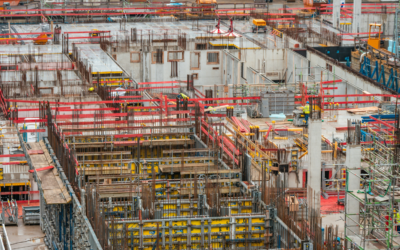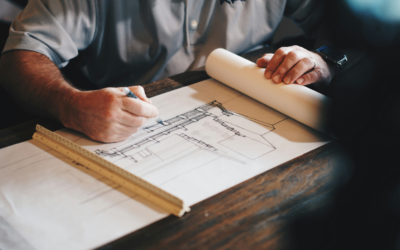Do you need building risk insurance? You likely do if you’re in the process of building.
Starting a business venture can be exhilarating, but it can come with its own set of risks that can damage your financial well-being if not handled properly. These risks can range from damage to your property or equipment to a liability claim made against your business. As a business owner, it is important to minimize these risks through all possible means. One such way is by building risk insurance. We will help you understand the importance of building risk coverage insurance for your business.
The first step towards building a comprehensive risk insurance plan is to identify the risks your business is exposed to. From there, you can choose the type of insurance policy you need to invest in. For instance, if your business depends on sales and marketing teams, it is important to have a comprehensive liability policy that can protect your business from liability claims arising from injury or damages caused by your employees. Identifying and mitigating risks beforehand can significantly reduce your overall insurance costs.
It is important to remember that risk insurance is not limited to just liability insurance. Depending on the type of business you run, you may also need to insure your equipment or property. For instance, if your business deals with heavy machinery or expensive equipment, you may want to consider investing in property insurance to safeguard your assets against damage or loss. By building a comprehensive risk insurance policy tailor-fit to your requirements, you can protect your business against unexpected risks and minimize the damages.
Another aspect to consider while building risk insurance is to ensure that you have enough coverage to handle the risks effectively. Undertaking a thorough risk assessment can help you determine the amount of coverage you will need to invest in. This can also assist you in ensuring that you avoid any financial losses in the event of a claim against your business. Properly estimating the coverage you need can also help you understand the costs involved and help you budget your insurance premiums effectively.
One of the main reasons businesses suffer financial losses during claims is due to insufficient insurance coverage. Imagine a scenario where your business is hit by a fire, and you do not have enough coverage to rebuild your damaged property. It can be devastating for your business and can even lead to its downfall. Building comprehensive risk insurance policies can help you mitigate the damages and ensure that you can rebuild your business in the event of an unexpected risk occurrence.

Building Risk Insurance VS General Liability Insurance for Commercial Contractors
Starting a commercial construction project requires careful planning, risk management, and a comprehensive understanding of the different types of insurance policies. Two of the most crucial insurances that commercial contractors must consider are Builder’s risk insurance and General liability insurance. While they may sound similar, and the terms are often used interchangeably, there are significant differences between the two policies.
Builder’s Risk Insurance
Builder’s risk insurance is a type of property insurance that offers protection to construction projects during the construction process. This policy provides coverage for damages caused due to natural disasters, theft, fire, and other unforeseen events. It typically covers the building, construction materials, equipment, and tools used during construction.
One of the significant benefits of builder’s risk insurance is it helps mitigate the financial risks associated with construction damages or delays. Most policies pay for the lost and damaged property and also provide funds to help cover the additional cost of labor, materials or rental equipment required in the event of a loss.
General Liability Insurance
General liability insurance protects commercial contractors from legal liabilities arising out of their business operations. This policy covers third-party bodily injuries, property damage, and advertising injuries that your business may cause. It also includes defense costs for lawsuits and settlements.
For commercial contractors, the risk of lawsuits can be high because of the nature of their business operations. By having a general liability insurance policy, the contractor is shielded from the financial impact of litigation expenses, which can sometimes go up to millions of dollars.
Key Differences
The key difference between builder’s risk insurance and general liability insurance lies in what they offer coverage for. The former focuses on property damage during construction, while the latter protects against third-party injuries and property damage.
Builder’s risk insurance is a temporary policy that covers for the duration of the construction project. General liability insurance is a long-term policy that covers a contractor for an extended period, usually one year or more, and is renewed annually.
Which Builder’s Risk Insurance Policy is Right for You?
When choosing what type of insurance policy is appropriate for your commercial construction company, you may want to consider these guidelines below.
For a construction project, builder’s risk insurance is essential as it provides coverage against the potential property damages and loss that can occur during construction.
General liability insurance is necessary to cover the risks of third-party injuries or damages that may occur due to your company’s operations.
It is essential to discuss with your insurance agent the specific risks associated with your construction business and find the right combination of insurance policies for your protection needs.
Insurance policies like Builder’s risk insurance and General liability insurance are some of the essential protections that commercial contractors need for their business operations. Both policies are designed to protect your business from financial losses, but they handle different types of risks. By understanding the differences between these two insurances, contractors can make better decisions when it comes to purchasing policies appropriate for their business. Choosing the right insurance coverage helps contractors manage risks effectively and focus on complying with building codes, safety guidelines, and delivering high-quality construction services.

Building Risk Insurance VS. Property Insurance
If you’re a contractor working in the construction industry, or are involved in property development projects, then choosing the correct type of construction insurance is essential. While both builders’ risk insurance and property insurance offer similar protection, there are a few key distinctions that you must keep in mind. We’ll explore the differences between the two and help you make an informed decision.
Coverage:
Builder’s risk coverage provides coverage for damage to the structure or building during construction, such as wind, rain, fire, theft, or even vandalism. It covers the building materials, equipment, and machinery used in construction, whereas property insurance typically provides coverage for already existing properties. Property insurance protects against damage to a building’s contents (upholstery, carpet, personal property) and the building’s physical structure.
Timing:
Another significant difference between these two types of insurance is the time frame involved. Builders’ risk coverage only applies during the course of construction or renovation projects while property insurance provides coverage year-round. The policy term for builders’ risk typically starts from the beginning of construction and ends when the final punch list items/inspections are cleared. If you are planning on having the property for a longer time after construction, you’ll need to convert the policy from builders’ risk to a property policy to ensure continuity of coverage.
Cost:
Builder’s risk insurance cost more than property insurance. This is because it provides short-term coverage, and construction projects are inherently more dangerous, with a higher likelihood of damage. Property insurance, on the other hand, has a larger customer base, which translates into a lower cost per policy. There may be discounts available by insuring the property with the same carrier who provided the builders risk insurance.
Liability:
Liability coverage is not included in a builder’s risk policy. Property insurance provides liability insurance coverage. This coverage is essential, primarily if people are injured on the property. It will cover the cost of any legal expenses arising from the injury. If someone is injured while construction is in progress, your general liability policy will come into play for that particular situation.
Deductibles:
Both builders’ risk and property insurance policies are subject to deductibles. The amount of the deductible varies depending on the level of coverage and risk involved. Builder’s risk policies may also have additional deductibles to cover specific types of damage; for instance, consecutive damage (damage caused by a loss occurring after another loss but before repairs have been completed from the first loss) is typically subject to separate deductible under a builder’s risk policy.
Understanding the differences between builders’ risk insurance and property insurance can help you make the right decision for your construction and renovation projects. While both policies provide valuable coverage, builders’ risk insurance is a short-term policy specifically designed to protect against damage during construction.

South Coast Improvement Company
When you are looking for the perfect contractor to handle your commercial project, look no further than South Coast Improvement Company. With our team of experienced contractors and customer service professionals, you can trust that we will work hard to make sure your construction needs are met efficiently and effectively.
Conclusion
Investing in building a comprehensive risk insurance policy may seem like a daunting task, but it is an essential step for every business owner. Insurance policies can protect you from significant financial losses due to unexpected risks. Conducting a thorough risk assessment, identifying the risks your business faces, investing in relevant insurance policies, and ensuring adequate coverage can help you mitigate the damages and move your business forward. By protecting your business from financial losses, you can ensure its longevity and mitigate the damages caused by significant risks.
View Our Work
Aspen Dental
Partnering with The Aspen Group on the construction of a new Aspen Dental facility that’s functional & welcoming for patients & staff alike. South Coast Improvement Company was awarded the construction of a new Aspen Dental facility in Killingly, CT. The...
Springhouse Senior Living – HumanGood
Designed to enhance comfort & functionality. South Coast Improvement company was hired by HumanGood for an interior and exterior renovation at Springhouse Senior Living. Our skilled teamtransformed the 2nd through 5th floor common areas into brighter, more...






